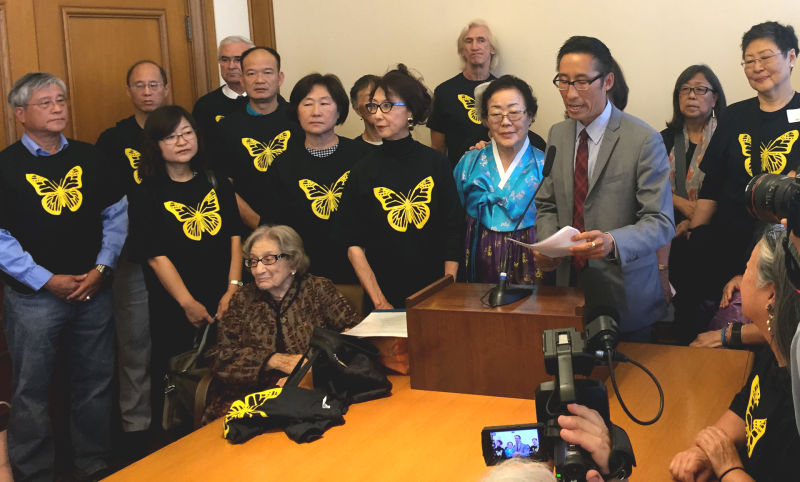Mar was joined by a special guest last week, Yong Soo Lee -- known to many by the honorific Grandma Lee. She is one of a few dozen Korean comfort women still alive, and she shared her story in emotional testimony.
Lee says she was kidnapped from outside her family home when she was 15 years old, taken to a brothel and repeatedly raped by Japanese soldiers.
"I am here standing here as the witness of the history," she told the packed room through a translator. "Why did I have to go through the near death, so many times, because I refused to go into the soldier's room? I almost died many times, but I survived."
Like many of the comfort women, Lee did not speak out about what happened to her until the 1990s.
But the issue of just what happened is a sticking point for some. Toru Hashimoto, the mayor of Osaka, San Francisco's sister city, wrote a nine-page letter to the board staunchly opposing the memorial.
Terumi Imamura is a San Francisco resident who also questions the comfort women narrative. "I understand this is a very sensitive issue, but there is no solid evidence for claiming that they were forcibly recruited and they worked as slaves," Imamura told the committee as many in the crowd loudly booed.
She also had supporters, as she went on to question why San Francisco is sticking its nose in a issue of long-standing tension between South Korea and Japan.
"If the city wants to build a statue for human rights -- the statue should represent women in all nationalities, and the wording should focus on human rights, rather than focusing on a specific country," Imamura said to loud applause.
Others in the Japanese-American community did not question the devastating history of the comfort women or the need for a memorial, but asked that the proposal be amended to avoid sowing anti-Japanese sentiment.
Caryl Ito, a founding member of the Pacific Asian American Women Bay Area Coalition, worried that the proposition would foster racism against the local Japanese-American population.
"Social justice," she said, "should never be at the expense of another ethnic group." She said the proposition's wording was spiked with hatred.
When questioned by Supervisor Mar as to where she found hatred in the resolution, Ito responded emotionally, "I feel you've been dismissive of the Japanese-American voice."
Others pointed out the many atrocities that Japanese and Japanese-Americans have undergone at the hands of the United States -- from the bombing of Hiroshima and Nagasaki to U.S. internment camps during World War II.
But those supporting the memorial, including some from the Japanese-American community, say honoring the comfort women in no way diminishes Japanese-Americans' experience or history.
Writer Peter Kenichi Yamamoto told the committee he supports the statue as an homage to the past that also calls attention to a modern-day struggle. "A memorial on city property would be appropriate, as human trafficking is a major problem in S.F. as we speak," he said.
Yamamoto also dismissed the notion that calling attention to the comfort women would spark racism.
"Freedom- and justice-loving Americans can distinguish between the war crimes of Imperial Japan and the present-day Japanese community," he said.
